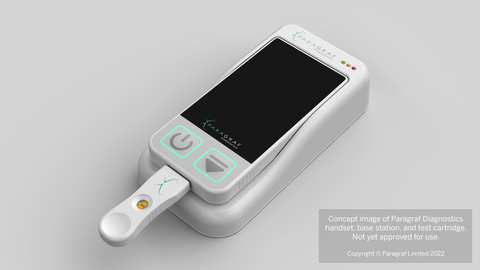CAMBRIDGESHIRE, England– Paragraf, the first company in the world to deliver a scalable approach to graphene electronic device manufacturing, announces today a plan to develop a new generation of graphene-based, in-vitro diagnostic products that will give results within a few minutes.
The Cambridgeshire-based company is starting a two-year programme to develop a proof-of-concept combined PCT (procalcitonin) and CRP (C-reactive protein) test, on a single panel. This collaboration utilises a GBP £550,000 Biomedical Catalyst grant award from Innovate UK, the UK’s innovation agency.
Paragraf is collaborating with the Universities of Liverpool, Manchester and Newcastle, Newcastle upon Tyne Hospitals NHS Foundation Trust and Manchester University NHS Foundation Trust (MFT), on the development.
A clinical study of the combined PCT/CRP test will be delivered at MFT’s Diagnostics and Technology Accelerator (DiTA) in mid-2023. DiTA aims to address unmet needs, transform patient care and improve efficiency within the NHS, by facilitating the rapid translation and adoption of new innovations into the health and care system. The project is expected to be completed by the end of May 2024.
Paul Dark, Professor of Critical Care Medicine at The University of Manchester, and Honorary NHS Consultant at Salford Royal, part of Northern Care Alliance NHS Foundation Trust, stated: “Nobel laureate scientists at The University of Manchester first isolated graphene in 2004 and so our city can claim to be the birthplace of the graphene industry. Today we are proud to announce that we will be working with Paragraf to develop this proof-of-concept graphene-based diagnostic.”
Professor Dark also leads the National Institute for Health and Care Research (NIHR) Manchester Biomedical Research Centre (BRC), Respiratory Non-fungal Infections Programme, which is focused on providing more accurate, rapid diagnosis for patients with severe respiratory infections. He said: “We expect to show that our proposed acute inflammatory marker test will have the capability to deliver accurate results for emergency patient care within a few minutes, from a small sample of blood. The accuracy of the test is envisaged to be at least comparable with hospital centralised lab-based immunoassay (antibody) tests which can take hours to provide results back to emergency services.”
Dr Tim Felton, Director of DiTA and an Intensive Care Consultant at Wythenshawe Hospital, which is part of MFT, said: “The main benefit of a single PCT and CRP test, is that a combined test increases confidence in the accuracy of the result when discriminating between bacterial and other infections.”
Dr Felton, who is also a Manchester BRC Researcher, within the Respiratory theme, added: “An accurate test able to provide results that can guide antibiotic therapy in real time is becoming a critical tool in the fight against antibiotic resistance.”
Professor Enitan Carrol, Professor of Paediatric Infectious Diseases at the University of Liverpool, added: “This technology reduces the time and complexity of sample preparation which, together with its rapid measurement speed, provides clinicians with accurate results in a timeframe that allows immediate decisions to be made on antimicrobial prescribing. This is especially important for the treatment of children and neonates.”
Malcolm Stewart, Paragraf Diagnostics Business Development Director, said: “This graphene-based diagnostic test is expected to become the first test in the world to give clinicians the ability to identify patients who need an antibiotic treatment within the space of a regular 15-minute clinic appointment. It encourages antimicrobial stewardship by giving clinicians the insight into when not to prescribe antibiotics as the test result differentiates viral from bacterial infections.
“Paragraf will go on to deliver a series of high sensitivity, rapid tests for disease biomarkers in areas including cardiovascular disease, oncology, and infectious diseases.
“The ambition is to develop a comprehensive suite of tests that could be used in almost any environment or healthcare setting. Our tests are designed to provide ultra-fast answers to diagnostic challenges and to reach beyond the concept of point of care testing to create a complete diagnostic toolkit at the point of need.”
Dr Will Jones, Senior Clinical Test Methodologist at the National Institute for Health and Care Research (NIHR) Newcastle In Vitro Diagnostics Co-operative (MIC), who will oversee the interviews with stakeholders, said: “This exciting project provides the opportunity for clinicians, patients and the public to shape the development of a novel diagnostic test technology.”
Simon Thomas, Paragraf CEO, said: “Paragraf has the ambition and proven ability to become a deep-tech graphene pioneer across several industries and, with our disruptive pipeline in novel IVD products, we aim to make a major contribution to resolving some of the most intractable problems in healthcare globally, including antimicrobial resistance, the early detection of cancers, and cardiovascular diseases.
“Paragraf is notable for its unique manufacturing process to reproducibly produce high purity, high-quality graphene directly on a substrate with minimal contamination. This proprietary process allows Paragraf to claim that it is the first company in the world to deliver a scalable approach to graphene-based electronic device manufacturing, with an unrivalled ability to harness one of the most conductive materials in the world.”
Paragraf raised USD $60 million in Series B financing announced on March 1, 2022.


